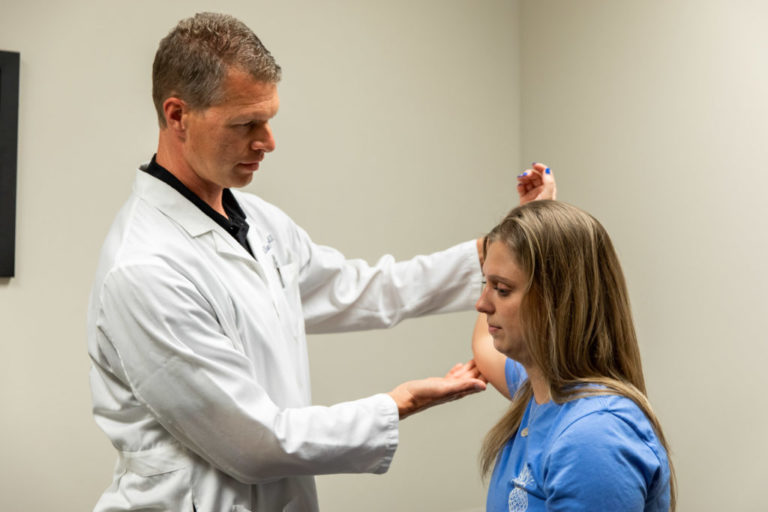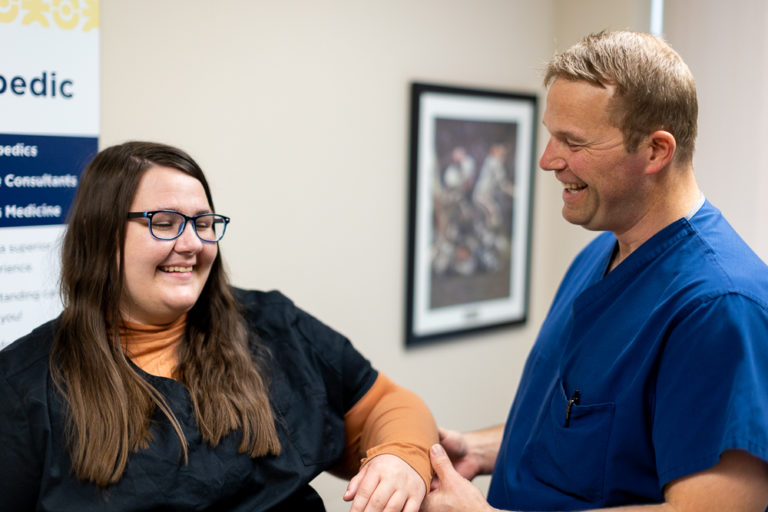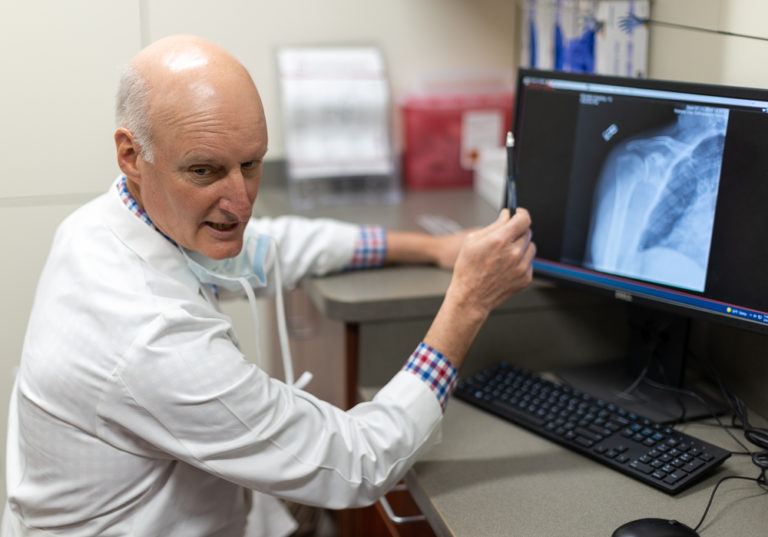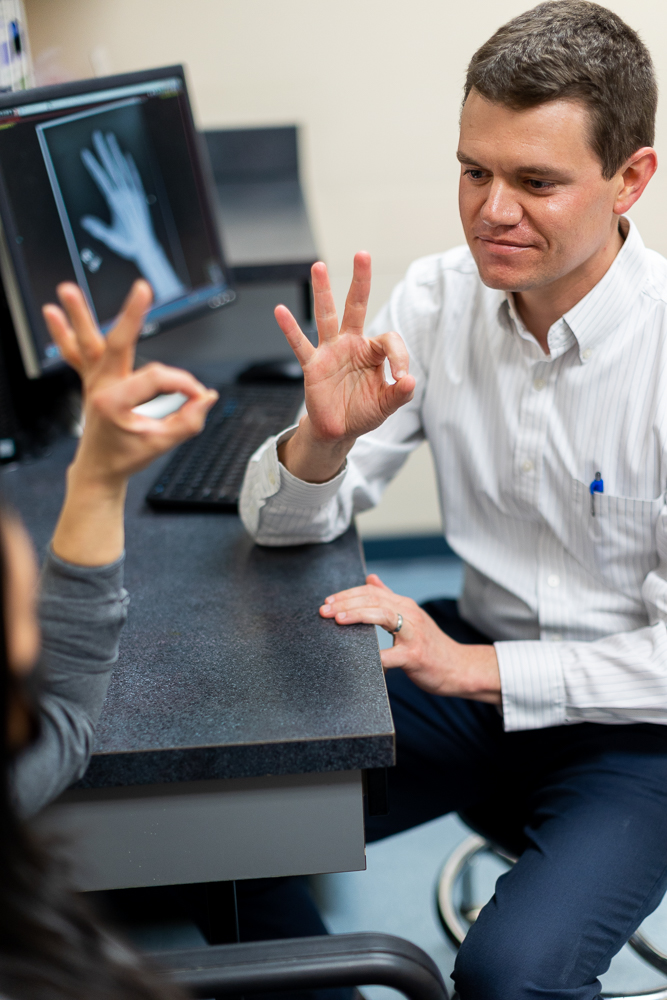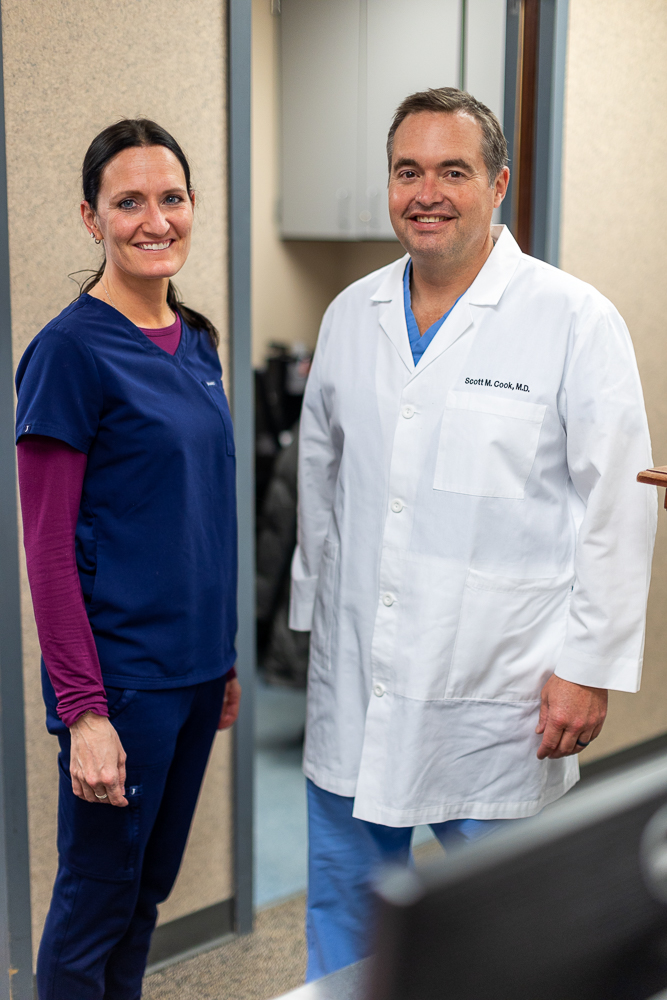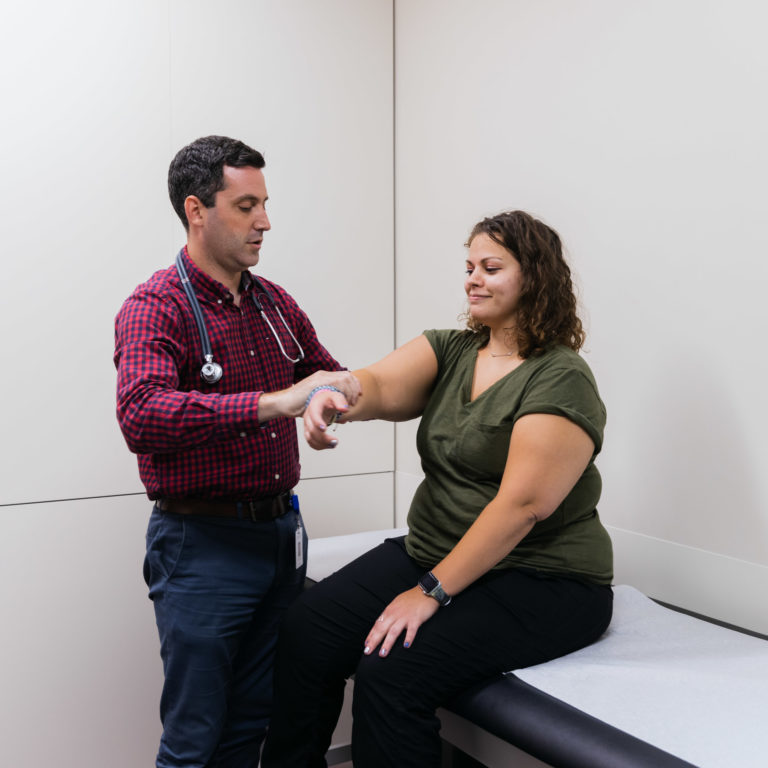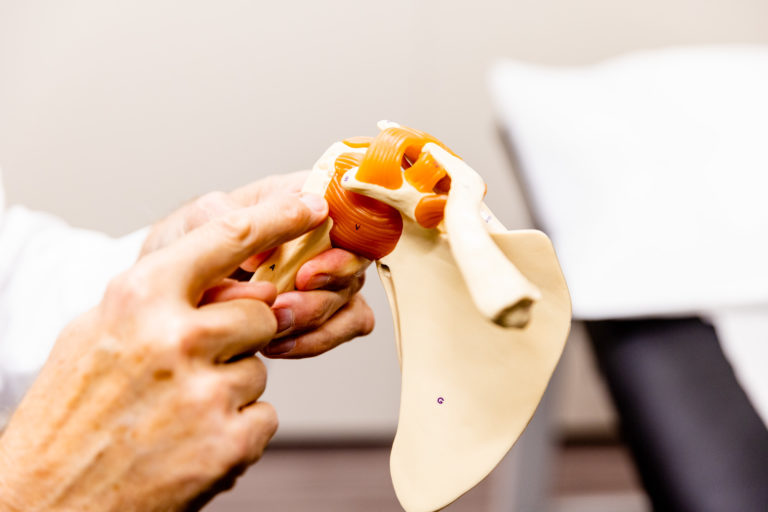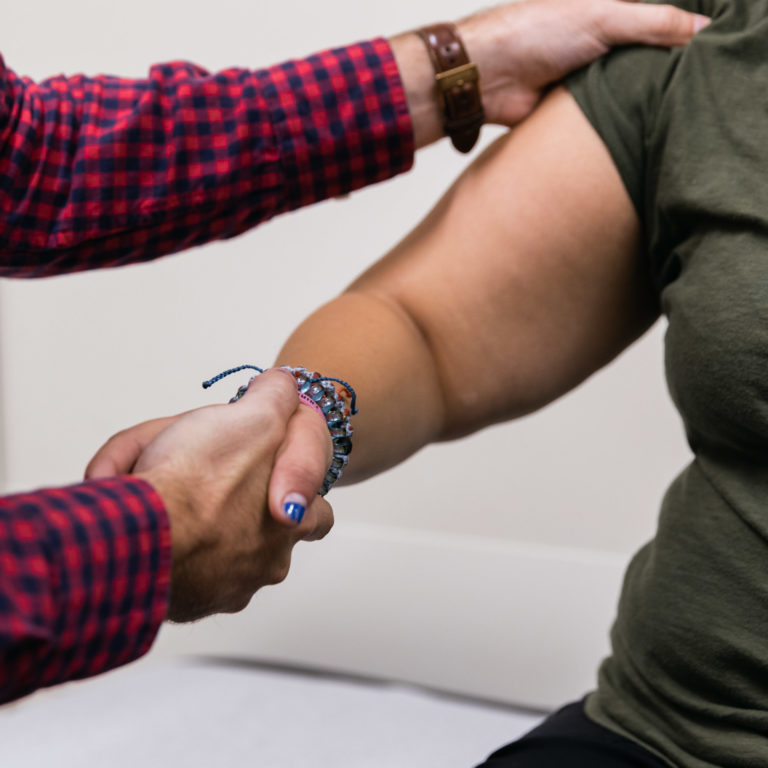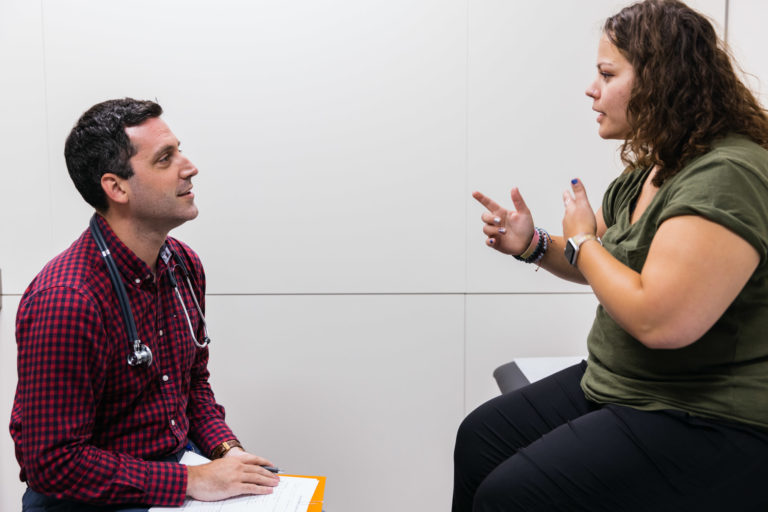Shoulder Replacement in Kansas City
Shoulder Replacement
Reliable joint replacement from Kansas City’s premier specialists.
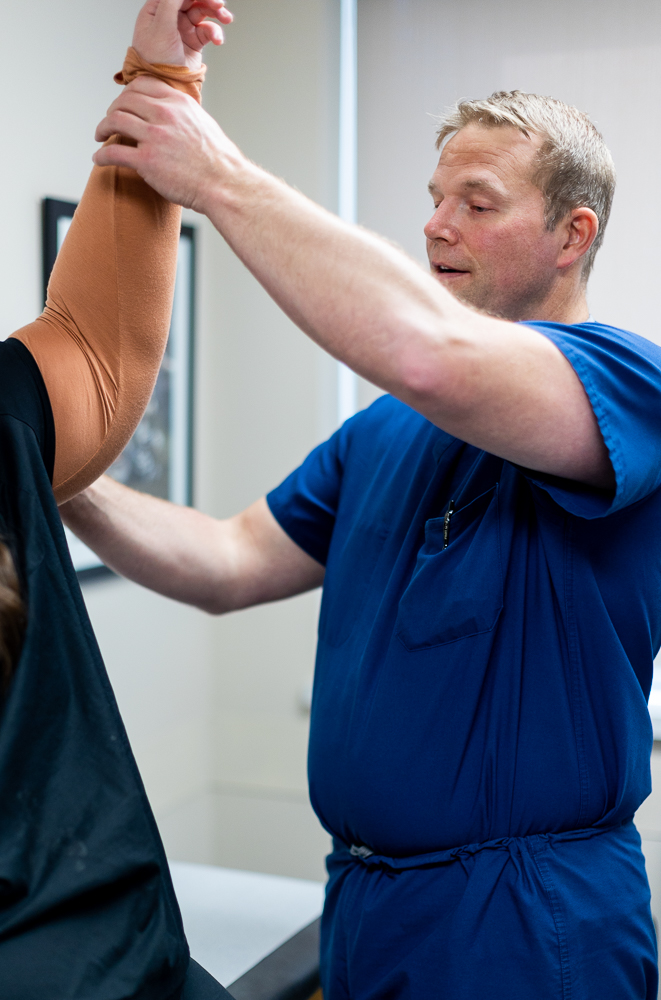
Understanding the Basics Behind Shoulder Replacement
What is Shoulder Replacement?
Shoulder replacement is a viable option for those patients who have experienced significant trauma or who have severe degenerative changes associated with the bone and surrounding supportive structures of the shoulder.
Shoulder replacement surgery repairs and replaces the damaged joint, providing pain relief and mobility for patients.
The orthopedic shoulder experts at Kansas City Orthopedic alliance aim to provide the best surgical experiences for our patients—from the first appointment to final discharge from care. Regardless of the treatment you require, we are here every step of the way.
Choosing shoulder replacement is a decision that involves guidance from your primary care doctor and orthopedic physician when other non-surgical options have been exhausted.
When you choose Kansas City Orthopedic Alliance for your shoulder replacement in Kansas City, one of our highly-trained orthopedic shoulder specialists will conduct an initial evaluation to better understand your condition. After a complete review of your results, your provider will then discuss whether shoulder replacement is the best treatment option for you.
Shoulder injuries can manifest in a variety of painful ways, from a constant dull pain to sharp pain when you lift your arm in a certain way (also referred to as a “catching pain”). Other common symptoms of shoulder injuries include:
- Reduced movement or pain when moving your shoulder
- Shoulder or upper arm weakness
- Numb or tingling sensations in your arms
- Burning sensation in your shoulder or arms
- Completely immobile or “locked” joint
If you’re experiencing any of the following symptoms and have tried non-surgical treatments for alleviating those symptoms, a shoulder replacement in Kansas City might be your best treatment option.

Kansas City Orthopedic Alliance Shoulder Injuries Assessment
Assessing the Injury
Finding the right shoulder treatment in Kansas City starts with an assessment.
You can think of shoulder pain as a spectrum, with some instances being more severe than others. The KCOA orthopedic specialists always focus on each individual patient and their concerns before creating a treatment plan.
Therefore, during your initial appointment, we will often ask questions such as:
- Does your pain currently limit you or your activities?
- Has your pain progressed or worsened recently?
- Have you experienced any locking in your shoulder or an inability to rotate your arm?
- Have you noticed any change in your symptoms that has made it more challenging to function?
- What are your lifestyle goals?
- How has pain affected those goals?
From there, we can decide whether shoulder arthroscopy will align best with your needs and lifestyle goals. After a proper assessment, we often begin with a physical examination to help determine the origin point of your pain. In some cases, advanced testing may be required for a full diagnosis.
Examination
X-Ray
Also called radiographs, an X-ray captures a picture of the bones comprising the shoulder. Orthopedic physicians may order an X-ray to rule out the possibility of a fracture (broken bone), osteoarthritis, or other bone-related condition.
Magnetic Resonance Imaging (MRI)
MRI captures images of muscles, bones, ligaments, and tendons to help provide information other tests can’t detail. During an MRI, you will lie on a table that slides into a tube-shaped scanner. The machine creates a magnetic field around you, using pulsed radio waves to form the MRI images.
Electromyograms (EMG) and Nerve Conduction Studies
Our board-certified physiatrists utilize electromyograms (EMGs) and nerve conduction studies to help determine whether nerves and muscles respond properly to stimuli. The EMG measures the electrical activity of your muscles at rest and in motion, while nerve conduction studies determine how fast and effectively your nerves and muscles receive electrical signals.
Causes
Causes of Shoulder Pain
The body has different kinds of joints, and they all face different challenges. The shoulder is a “ball-in-socket” joint, meaning it’s composed of a ball-like structure that moves inside a depression in the bone to allow for rotational movements. The ball-shaped head of your humerus (upper arm bone) that fits into the glenoid cavity in the scapula (shoulder blade) creates the shoulder joint.
Shoulder pain that requires a replacement can come from a variety of sources that help compose the joint.
Treatment Alternatives
Non-Surgical Treatment
Surgery, even minimally invasive ones like shoulder arthroscopy, isn’t necessarily the first choice. Kansas City Orthopedic Alliance physicians prefer a more conservative approach to treatment, so we will typically exhaust all non-surgical options before recommending surgery. Non-surgical treatments for shoulder injuries include:
-
Physical Therapy – Movement can actually reduce pain and encourage healing in the shoulder, as movement increases circulation in the joint, supplying oxygen and other nutrients that support joint health and function.
-
Medications – Your doctor may recommend over-the-counter NSAIDs (Non-steroidal anti-inflammatory drugs, such as Advil) or prescription medications. Especially with NSAIDs, you should always talk to your doctor to ensure they are the right treatment for you.
-
Injections – Cortisone injections can help reduce inflammation in the shoulder and can even provide additional insight into the cause of your shoulder pain. The amount of relief from an injection varies by patient, but often in combination with physical therapy, patients can experience significant improvements in their function.
-
Regenerative Medicines – Regenerative medicines like stem cell injections or platelet-rich plasma can help nourish worn or damaged tissue. This option works best if you have mild-to-moderate shoulder pain.
F.A.Q.
Frequently Asked Questions
Trust KCOA for the best shoulder replacement in Kansas City.
Our care is personal. Our team is knowledgeable. And we’re more available than ever.
With access to board-certified specialists across Kansas City, we have the tools to meet almost every musculoskeletal condition.
Our Locations
Overland Park, Kansas
10777 Nall Ave Suite 300 Overland Park, KS 66211Leawood, Kansas
3651 College Blvd. Leawood, KS 66211Kansas City, Missouri
Saint Luke's Medical Plaza #1 4320 Wornall Rd., Ste. 610 Kansas City, MO 64111Belton, Missouri
Belton Regional Campus 17067 S Outer Rd #301 Belton, MO 64012Blue Springs, Missouri
St. Mary’s Medical Center, Main Entrance 203 NW R.D. Mize Road, Suite 200 Blue Springs, MO 64014Shawnee Mission, Kansas
7450 Kessler St ste. 140 Merriam, KS 66204Prairie Star (Lenexa, Kansas)
Prairie Star 23401 Prairie Star PkwyBldg. B, Ste. 220 Lenexa, KS 66227

